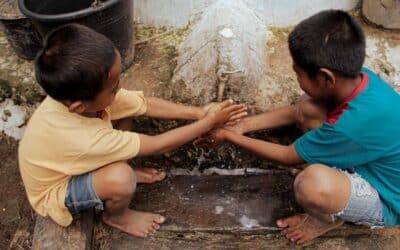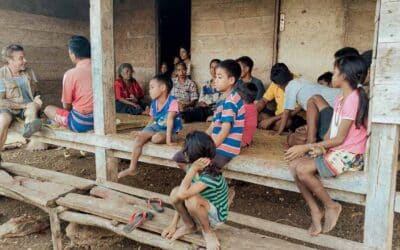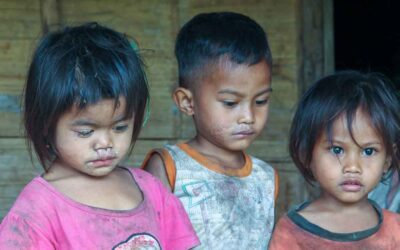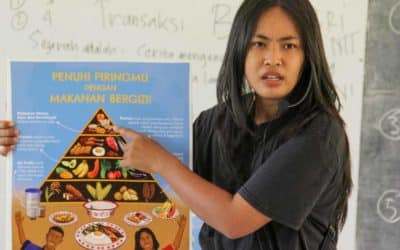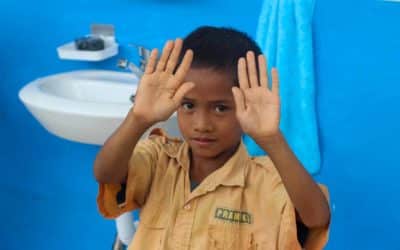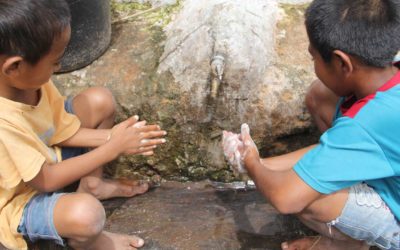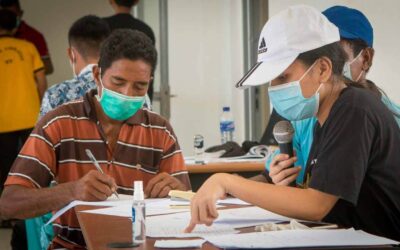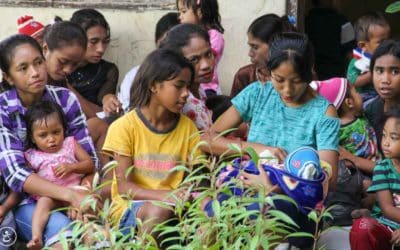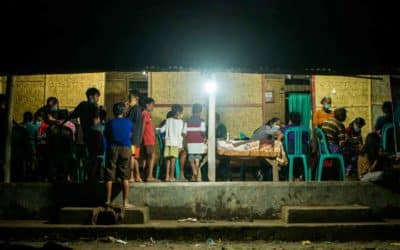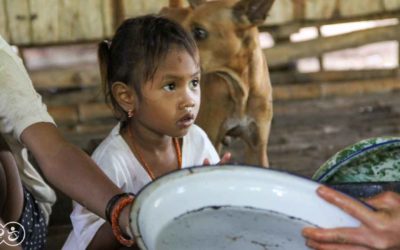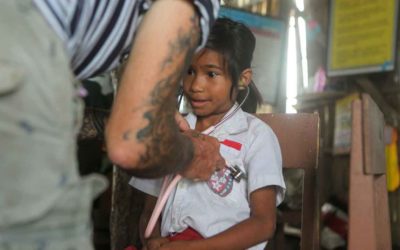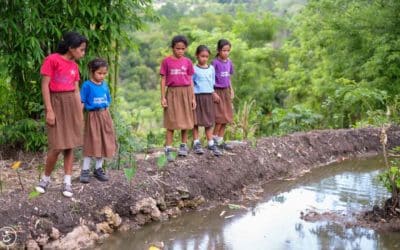In ultra-rural areas, the act of handwashing is not merely routine but a crucial, life-saving measure. This simple yet...
Children can't learn effectively in darkness or when suffering from chronic infections. By electrifying schools, improving nutrition, and providing treatment for common illnesses, we create safe environments for learning and development. In this way, education acts as a shield against poverty and social exclusion.
Donate
Support Care
Programs
All projects
Quick News
Field updates
Stories
Field stories
Responding rapidly to epidemics with education, prevention, and medical care to save lives.
Indonesia’s rise in mumps cases poses a growing threat
Mumps cases are rising in Indonesia, particularly in rural areas. Understand how the virus spreads, the symptoms, the serious risks it poses, and the urgent actions needed to protect vulnerable communities through education initiatives and improved vaccination campaigns.
Polio Resurgence in Remote Indonesia: Urgent Action Needed
Polio is making a comeback in Indonesia, particularly in the areas where we operate. This outbreak is connected to inadequate hygiene practices, insufficient sanitation, and restricted access to clean water. With limited resources, we are vigorously combating it by launching prevention campaigns and enhancing water access as well as sanitation facilities to safeguard vulnerable communities.
Healthy Living with Clean Water and Nutrition
In East Sumba, the Fair Future Foundation is transforming lives through its Water Connections program, providing clean water, improving hygiene, and promoting nutritious meals and healthy lifestyles for a brighter and healthier future for all.
Clean Water for Handwashing in Rural Communities
In East Sumba, the Fair Future Foundation’s #WaterConnections project has improved access to clean water and hygiene. This initiative has reduced infectious diseases and improved living conditions by installing washbasins and handwashing stations. The Foundation has provided clean water to over 600 people in Laindatang, demonstrating the positive impact of their efforts.
Let’s Wash Your Hands: A Lifeline for Rural Health
In East Sumba, washing hands is a lifesaving act. Fair Future Foundation’s ‘Let’s Wash Your Hands’ campaign, through Water Connections, has installed sinks in schools and villages, helping children fight diseases and grow healthily.
Together, we are joining forces in a powerful effort to combat malaria
A collective initiative against malaria is currently underway in East Sumba, Indonesia. Fair Future, kawan baik, and Sumba Volunteers have joined forces with over 100 volunteers, including doctors, nurses, laboratory technicians, water experts, builders, and government officials. Their primary objective is to eradicate malaria entirely within a practical period, focusing on prevention, diagnosis, and treatment methods.
Malaria Program – Preparing and Mobilizing Resources
As we mentioned in last week’s newsletter, Fair Future Foundation, Kawan Baik Indonesia, and Sumba Volunteer are joining forces to launch a crucial health and medical operation to combat malaria in the Mahu region of East Sumba, Indonesia. The “Malaria Prevention Initiative 2023 – Sumba Timur 2023” aims to prevent, detect, and treat this devastating disease in one of the most affected regions. Malaria has become endemic in this area, establishing itself and finding a conducive environment for its spread, leading to an unprecedented increase in cases in recent months.
Disease prevention, detection and treatment in rural areas
The teams of Fair Future and Kawan Baik are highly respected for their steadfast dedication to assisting ill and underprivileged individuals residing in far-flung rural areas of eastern Indonesia. Their selflessness holds true significance to them. However, it's not widely known that their medical and social teams put in tireless efforts, even during nighttime and 7-day workweeks. Through this new "Picture of the Day," we offer you the opportunity to witness their work as they combat health issues like malaria, unsafe water, and malnutrition while sacrificing their sleep.
Diseases can strike at any time, even in the darkness of night. The teams, equipped with masks and Sumba coffee, fight against these illnesses. And during this time of the malaria epidemic, doctors, nurses and volunteers are working tirelessly to provide treatment to patients.
Their dedication and passion go above and beyond the call of duty, even working late into the night to provide lifesaving care. They save lives and do so with unwavering energy and enthusiasm.
On the spot, at all hours of the day or night, they not only treat the symptoms, they also attack the root causes of health problems. Fair Future and Kawan Baik foundation fight against diseases related to dirty water by providing facilities through the #waterconnections program and raising awareness in communities about the importance of hygiene. Their mission is to make communities more resilient and prevent diseases before they even appear.
Even when faced with difficult challenges and trying situations, the teams remain resilient and optimistic. Their sense of humor is a crucial component that aids them in overcoming tough times. It also fosters a strong bond between them, enabling them to maintain a positive outlook.
Alex Wettstein shares a few words about the Foundation's medical and social teams, who work tirelessly to help people who are sick or have urgent needs.
Sumba Malaria Prevention Program 2023
Discover how the East Sumba Malaria Prevention Initiative we are presently executing is combatting this destructive ailment. By implementing preventive measures like distributing mosquito nets treated with insecticides and raising awareness on eliminating mosquito breeding sites, this initiative strives to diminish the occurrence of malaria in the area. Witness the combined efforts of Fair Future and Kawan Baik, working together with local authorities and the severely impacted ultra-rural communities, to safeguard the population against this mosquito-transmitted disease.
Behavioral Impacts on Spread of Malaria
Beyond Borders: Fighting Malaria Together in Eastern Indonesia. This new "Picture of the Day" shows a young girl from Lapinu village who appears unwell. Taken in 2020, Alex examined her and used a stethoscope to listen to her heartbeat. In April 2023, we revisited the village as part of the Primary Medical Care program. Unfortunately, the girl contracted malaria and suffered from high fever, body pains, and poor overall health. However, after receiving treatment and giving advice to her mother, the little girl has shown significant improvement after just one month.
Our organisation is dedicated to promoting public health in ultra-rural regions of Indonesia (like here in East Sumba), and we're deeply concerned about the impact of malaria on vulnerable communities, as you know already. Sadly, malaria remains a leading cause of illness and death in Indonesia, particularly in East Sumba, where we are based.
Some little history: The word "malaria" originates in Italian. It comes from the expression "mal'aria", which translates as "bad air". This term was used historically to describe the belief that disease was caused by inhaling polluted or stale air in swampy areas. The Plasmodium parasite is responsible for causing malaria, and research suggests that it has been affecting humans for at least 4,000 years.
Several human behaviours contribute irreparably to the spread or persistence of malaria. Here are some of the factors that lead to an increase in malaria cases:
Failure to prevent mosquito bites, poor waste management, inadequate housing and sanitation, deterioration of hygienic conditions, deforestation, alterations to natural habitats, movement of people, drug resistance*** and misuse, limited access to health services, higher illiteracy rates among younger populations, and lack of community involvement and awareness can all lead to an increase in malaria cases… And this, among other examples!
As a result, many people, particularly children and pregnant women, continue to suffer from this preventable and treatable disease. Our program aims to tackle these issues head-on by implementing various activities to strengthen malaria control efforts in the region. It is crucial to highlight that combatting malaria demands a unified strategy encompassing preventive and therapeutic measures. It also involves initiatives to enhance the environment and living standards of communities affected by the disease.
***The problem of self-medication and the consequent development of resistance to antimalarial drugs are two interconnected challenges that significantly hinder the effective management and control of malaria.
Our aim is to take swift action against malaria
Malaria has a significant impact on Eastern Indonesia, specifically Sumba Timur, due to its remote and inaccessible locations, insufficient healthcare infrastructure, and limited preventative measures. Plasmodium falciparum and Plasmodium vivax malaria are both prevalent in these areas, with malaria transmission occurring year-round. We have partnered with various donors and organizations to take swift and efficient action to address this critical health issue.



